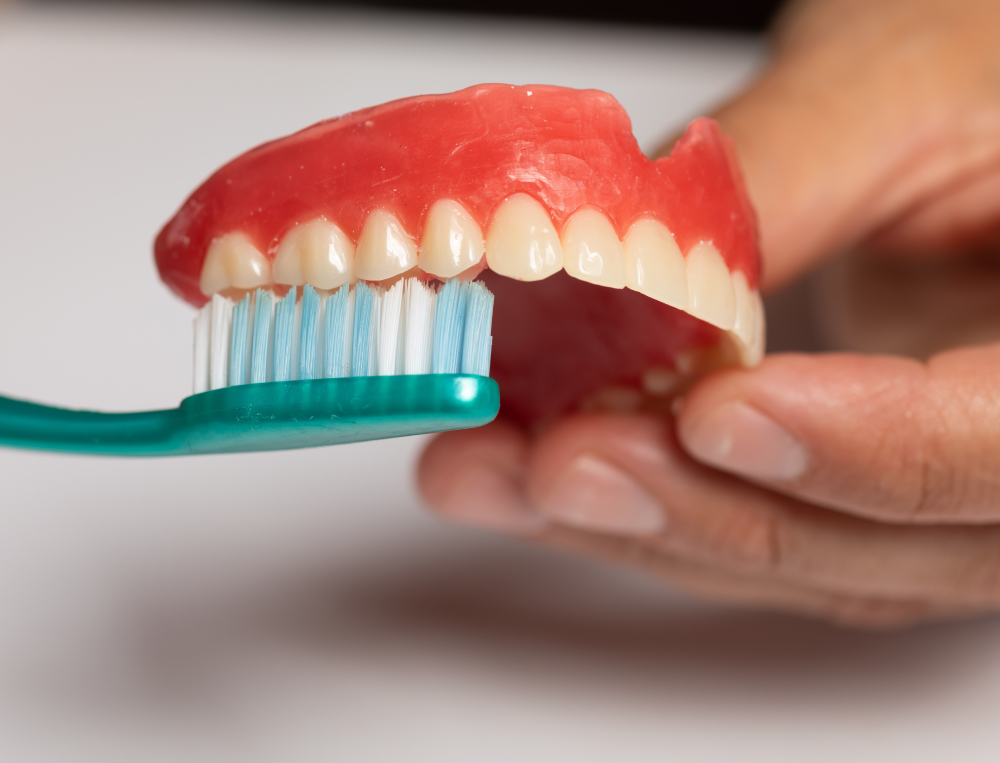Dentures and partials are more than just replacements for missing teeth—they are essential tools that restore function, support oral health, and enhance confidence. However, their effectiveness and longevity heavily depend on proper care, a topic often overlooked in discussions about dental hygiene. Unlike natural teeth, dentures and partials are made from materials that require specific cleaning techniques to prevent damage, maintain their appearance, and ensure a comfortable fit.
Improper cleaning can lead to more than just cosmetic issues; it can cause bacterial buildup, unpleasant odors, and even oral infections like stomatitis. Many people are unaware of how their daily habits, cleaning routines, or storage practices may unintentionally harm their dentures. This guide offers a comprehensive look at the steps needed to clean and maintain dentures and partials effectively. Whether you’re new to wearing dentures or seeking to improve your care routine, this article provides actionable insights to protect your investment and promote better oral health.
Understanding the Basics of Denture and Partial Care
Dentures and partials serve as valuable solutions for replacing missing teeth, but their care requirements differ significantly from those of natural teeth. These dental appliances are made from specialized materials, such as acrylic, resin, and metal alloys, designed to be durable yet lightweight. While these materials mimic the appearance and function of natural teeth, they are more susceptible to damage from improper cleaning techniques or harsh products.
What Makes Dentures and Partials Different?
Dentures and partials lack the natural protective enamel found on teeth, making them more vulnerable to scratches and stains. Additionally, their surfaces can harbor bacteria and food particles if not cleaned thoroughly. Unlike natural teeth, they rely on a snug fit against the gums or attachment to surrounding teeth, which can shift or become uncomfortable if not properly maintained.
Risks of Neglecting Proper Cleaning
Failing to clean dentures and partials regularly can lead to significant oral health issues. Bacterial buildup on their surfaces may result in gum irritation, bad breath, or infections like denture stomatitis. Stains from coffee, tea, or tobacco can dull their appearance, while plaque accumulation may compromise their fit. Understanding these risks highlights the importance of adopting a consistent and effective care routine to preserve both the functionality and aesthetics of your dentures.
Daily Cleaning Routine for Dentures and Partials
Maintaining a daily cleaning routine for your dentures and partials is essential to ensure their longevity, maintain their appearance, and support your overall oral health. Unlike natural teeth, dentures require specific care techniques to avoid damage and ensure a proper fit. Establishing good habits can prevent bacterial buildup, staining, and discomfort. Here’s a step-by-step guide for effective daily care:
- Rinse immediately after eating: Remove your dentures and rinse them thoroughly under lukewarm water to wash away food particles and prevent staining. Avoid using hot water, which can warp the material.
- Brush gently with a non-abrasive cleaner: Use a soft-bristled toothbrush or a special denture brush with a mild, non-abrasive cleaner. Avoid regular toothpaste, as its abrasiveness can scratch the denture surface.
- Clean all surfaces, including attachments: Ensure you brush every part of the dentures, including the undersides and any metal clasps on partials, to remove plaque and debris.
- Soak overnight in a denture solution: Place your dentures in a soaking solution designed for their material. This helps keep them moist and maintains their shape while also killing bacteria.
- Rinse before wearing: Before putting your dentures back in, rinse them thoroughly to remove any residual cleaning solution, which can irritate your mouth.
By following this routine, you can keep your dentures and partials clean, comfortable, and in excellent condition.
Advanced Denture Cleaning Tips for Longevity
For those looking to go beyond the basics, incorporating advanced cleaning techniques can significantly enhance the longevity and functionality of your dentures and partials. While daily care routines are essential, advanced methods help address deeper stains, hidden bacteria, and long-term maintenance challenges. Here are some expert tips to keep your dentures in optimal condition:
- Invest in an ultrasonic cleaner: Ultrasonic cleaning devices use gentle vibrations and specialized cleaning solutions to dislodge debris and bacteria from hard-to-reach areas. This method is especially effective for removing stubborn buildup without damaging delicate materials.
- Use a professional denture cleaning solution weekly: In addition to daily soaks, use a professional-grade cleaning solution once a week to eliminate stains and odor-causing bacteria. These products are formulated to maintain the color and integrity of your dentures.
- Avoid DIY whitening techniques: Common remedies like baking soda or hydrogen peroxide may seem effective but can be abrasive or damaging to denture surfaces. Stick to products designed specifically for dentures to preserve their finish.
- Polish with a soft cloth: After cleaning, use a soft, lint-free cloth to polish your dentures. This can help restore their shine and remove any residual moisture or cleaning solution.
- Store dentures in a safe container: When not in use, keep your dentures in a sturdy, ventilated container filled with soaking solution. This prevents accidental drops and keeps them ready for daily wear.
Incorporating these advanced tips can help ensure your dentures look and feel their best for years to come.
Common Mistakes to Avoid When Cleaning Dentures
Proper denture care is essential for maintaining their longevity and ensuring your oral health. However, even with the best intentions, some common cleaning mistakes can lead to damage or discomfort. Being aware of these pitfalls can help you avoid unnecessary repairs and keep your dentures in top condition.
- Using harsh or abrasive cleaners: Products like regular toothpaste, bleach, or household cleaners may scratch or weaken the surface of your dentures, compromising their appearance and structural integrity.
- Skipping daily cleaning routines: Failing to clean your dentures every day allows plaque, food particles, and bacteria to accumulate, leading to unpleasant odors, stains, and potential oral health issues.
- Brushing too hard: Using excessive pressure or hard-bristled brushes can cause scratches or wear on the surface, making dentures more susceptible to staining and bacterial buildup.
- Not rinsing thoroughly: Leaving cleaning solutions or debris on your dentures can irritate your gums and lead to discomfort or infections over time.
- Using hot water: Cleaning dentures with hot water can warp or distort their shape, especially for partials that include metal components. Always use lukewarm water for rinsing and soaking.
- Neglecting soft tissue care: Focusing solely on the dentures while neglecting to clean your gums, tongue, and other soft tissues can lead to infections or improper denture fit.
Avoiding these common mistakes ensures your dentures remain functional, comfortable, and visually appealing while promoting better overall oral health.
Preventing Long-Term Damage to Dentures and Partials
Preserving the integrity of dentures and partials requires more than just daily cleaning—it involves proactive care and mindful habits that minimize wear and tear over time. Proper maintenance not only enhances the lifespan of these dental appliances but also ensures they remain functional and comfortable. One critical practice is handling your dentures with care. Dropping them, even from a short height, can lead to cracks or chips that compromise their fit and appearance. Always handle them over a soft surface, like a towel, to prevent accidental damage.
Storage also plays a vital role in preventing long-term issues. Dentures and partials must be kept moist to retain their shape. Allowing them to dry out can cause them to warp, leading to discomfort or a poor fit. Use a soaking solution specifically designed for your type of denture, and avoid leaving them in plain water for extended periods, as this can degrade certain materials.
Dietary choices can also impact the longevity of your dentures. Avoid excessively sticky or hard foods, which can place undue stress on the appliance. Chewing gum or biting into hard objects, like ice or nuts, should be avoided entirely to prevent fractures or wear. Regular dental checkups are equally essential, as they allow your dentist to monitor the condition of your dentures and make adjustments as needed to maintain a secure and comfortable fit. Implementing these strategies can protect your dentures from unnecessary damage and ensure they continue to serve you well.
Conclusion
Caring for dentures and partials is essential to maintain their function, comfort, and appearance. With the right cleaning routines, advanced care techniques, and attention to potential mistakes, you can extend the lifespan of your dental appliances while supporting your overall oral health. By preventing long-term damage and ensuring proper hygiene, you can enjoy the confidence and functionality that well-maintained dentures provide.
At District Dental Solutions, we are dedicated to helping you achieve optimal oral health, whether it’s through personalized advice for denture care or routine dental checkups. Our experienced team is here to provide the guidance and professional support you need to keep your smile healthy and radiant.
If you have questions about caring for your dentures or need assistance with maintenance, adjustments, or replacements, we’re here to help. Schedule an appointment with us today or call (202) 955-5787 to speak with our team. Let us partner with you to ensure your smile stays as comfortable and confident as possible for years to come.


